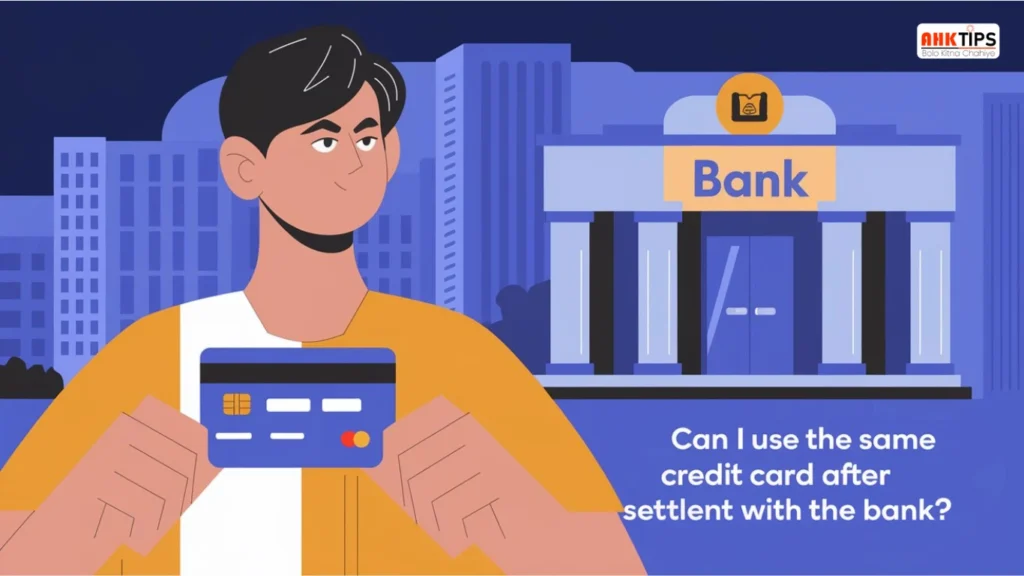Credit card debt has sometimes gotten completely out of hand, where one ends up settling on credit card settlement. Settlement is the agreement that the borrower can negotiate with the bank to pay just a fraction of the money owed and settle the account. However, this process has far reaching effects on your credit profile and financial choices. Probably one of the most common questions after settlement is whether you can continue using the same credit card.
In this blog, we’ll explore what happens to your credit card after settlement, the bank’s approach to settled accounts, and alternative options for using credit post-settlement.
Understanding Credit Card Settlement
Credit card settlement is an alternative that banks present to help individuals settle out-of-course credit card balances when unable to pay out in total. The bank usually proposes this when it predicts a large possibility of default on the payments. In the settlement process, the cardholder agrees to pay a fraction of the outstanding balance and the bank records it as “settled” instead of “paid in full.” This way, the bank will recover part of the debt, and some relief will be given to the borrower.
However, settlement of credit card debt is not the same as full repayment and has consequences such as a serious hit on credit scores and restrictions on future access to credit.
What Happens to Your Credit Card After Settlement?
So basically when settling a credit card account usually results in closing out an account. Most lenders refrain from allowing usage if there is a settlement performed due to the fact settlement actually means financial stress which essentially means less capability for people to pay back for certain periods of time, like usually until the debt pays down. Here’s basically how:
- Account Closure: It is normally at the moment of settlement when the banks close the account. Then, your card cannot perform any more transactions. At this point, your account status will appear as “settled” on your credit report. This could affect your credit profile for a period of up to seven years.
- After being settled, the credit card account becomes inactive, and because of the negative mark put on your financial record through the settlement, banks rarely reactivate the same card.
Can You Reopen a Settled Credit Card Account?
Usually, it will not activate or open a reopened credit card that is the same account that is already settled. Settlement indicates financial risk on the part of the bank, and therefore, the process makes reopening a bit of a risk because of the probable takeover of the same account again. However, based on every bank’s policy, the following would be some kind of general notion:
- Fresh Credit Card Application Required: Rather than re-opening the already settled credit card, you’ll be forced to apply for a fresh credit card.
- Higher standards of acceptance: For customers with settled accounts, banks will be very demanding on a new application with regards to financial status.
- Wait period: It is generally recommended not to apply for another credit card immediately as the banks may refuse the application due to recent settlement.
Key Factors Determining Future Credit Eligibility
Credit card loan settlement can impact your ability to obtain future credit. Here are some factors that influence whether you’ll qualify for new credit:
- Credit Score: Your credit score likely decreased after the settlement, impacting your ability to get new credit.
- Income Stability: An income that is steady and sufficient would boost up the chances of obtaining a new credit card.
- Existing Liabilities: The banks will check the existing liabilities. High levels of debt make it difficult to get approved.
- Length of Credit History: A longer and positive credit history can offset some of the settlement’s impact, although it will still be something that the lender will weigh in their decision.
How Long Do the Settlement Effects Last?
The “settled” status stays on your credit report for seven years. However, this duration may vary depending on the credit bureau and how long it takes to rebuild your credit score. However, while in this cycle, getting new credit credit cards and loans will have attached restrictions like:
- Higher interest rates: Banks will readily give loans or credit cards, but they will attract high interest rates.
- Lower Credit Limits: The credit cards are approved but at lower credit limits than usual due to perceived risk.
- Increased Scrutiny: Lenders may require more documentation or place stricter terms on credit agreements due to your settlement history.
- You can reconstruct your creditworthiness in time before the seven years are up by conducting yourself properly financially.
Alternatives to Using the Same Credit Card After Settlement
Though one cannot use the same credit card, there are other options to be considered:
- Secured Credit Card: Secured credit cards are available against a fixed deposit, which makes it accessible for individuals with a poor credit score. They provide an excellent opportunity to rebuild credit with responsible usage.
- Co-signed credit card: If there’s a credit-worthy family member who will vouch for you, co-signing on a new credit card could work as well. Again, be responsible and make timely payments to keep up the progress.
- Authorized User on Another Card: It allows you to use the credit of someone else and it positively impacts your credit score, if the person on whose card you have been an authorized user has good credit.
Tips to Improve Creditworthiness Post-Settlement
Rebuilding credit after settlement is essential to accessing future financial opportunities. Here’s how to improve your creditworthiness:
- Timely Payments: Ensure timely payments on all existing loans and credit cards. Payment history is crucial in improving your credit score.
- Low Credit Utilization: Try to keep your credit usage below 30% of your credit limit. A low utilization rate reflects positively on your credit profile.
- Limit New Credit Applications: Applying for several credit products within a short period raises your score because each new application triggers a hard inquiry, which further lowers it.
- Check Your Credit Report: Checking your credit report regularly ensures that errors or inaccuracies are corrected, improving your score.
- Consider Credit-Builder Loans: There are certain small loans introduced by banks that help improve your credit. Small loans, if paid on time, contribute positively to the credit report.
Conclusion
One of them is credit card settlement which relieved that individual in crisis but long-term effects also are caused to him. Once credit cards are settled, it becomes impossible to use credit cards since banks close all accounts settled in order to prevent any increased financial risk. Nevertheless, different alternatives are available to rebuild credit once again such as secured credit cards, co-signed cards, or even authorized users.
It takes a long time and effort to rebuild your credit profile after settlement. Showing responsible financial habits, keeping a lid on debt, and servicing all obligations on time would improve your credit score gradually. Knowing the after-effects and focusing on recovery will help rebuild your credit profile and provide better opportunities for the future.
Frequently Asked Questions (FAQ’s)
Ans: Generally, no. Banks typically close the account after settlement, preventing further use of the same credit card.
Ans: Credit card settlement significantly lowers your credit score as it indicates partial payment and financial distress. This mark remains on your credit report for up to seven years.
Ans: You can apply, but approval may be difficult. Lenders view settled accounts as high-risk, so it may take time and consistent, responsible credit behavior to rebuild eligibility.
Ans: Yes, secured credit cards are one of the best options for rebuilding credit after settlement. Since they require a deposit, they’re accessible for individuals with lower credit scores.
Ans: It’s wise to wait at least 6-12 months while focusing on rebuilding your credit score. During this period, responsible financial behavior can help improve your credit profile.













